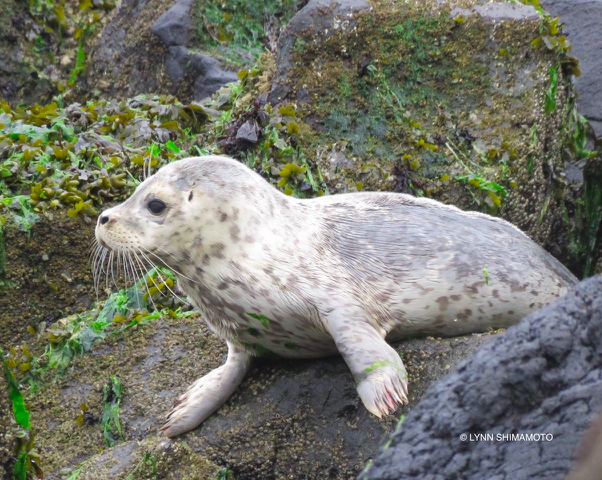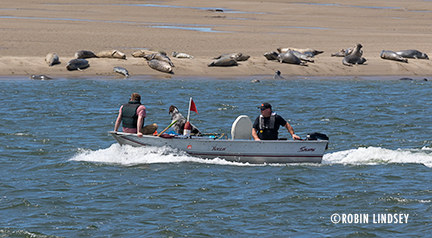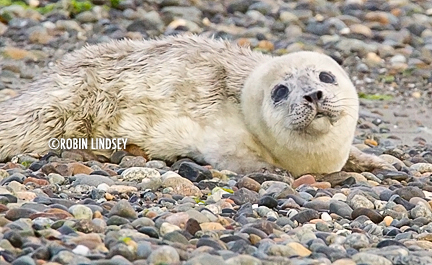Seal pupping season underway in Washington
Jul/10/20 09:31 AM

Rotund pregnant females can be seen hauled out on sandbars and rocky outcroppings, waiting to give birth. Seal moms with nursing newborns, along with pups that are newly weaned and independent, are resting on shore, log booms, private docks and marinas. For a map showing pupping seasons in the various regions of Washington state, click here.
DO NOT FEED, TOUCH OR MOVE SEAL PUPS - ALWAYS STAY BACK
Please be alert if you are strolling along ocean and Puget Sound beaches. On outer coast beaches that permit driving of motorized vehicles, be extra cautious - a tiny seal pup can look like a piece of bleached driftwood, easily run over and killed. If you come across a pup, please stay back and observe quietly from a distance. Contact the local stranding network.
It is normal for a seal pup to be alone on the beach - always keep dogs leashed and away. Stay back. Occasionally a mother harbor seal will leave her pup resting alone, returning to nurse. Or, if a pup was born on a dock or raft, often the pup cannot get back up onto the structure with mom and will end up on shore nearby. If there are people and dogs too close, she may abandon the pup. Most times, however, the pup will accompany mom to learn how to forage.
Once pups are weaned at 4-6 weeks, they will be all on their own, using shoreline daily to rest and warm up before returning to the water. Weaned seal pups need space to rest undisturbed as well. A pup that is scared into the water wastes precious calories - and this can truly be the difference between life and death. Seals of all ages rest on shore about 50% of their day. Undisturbed, stress-free rest is crucial to their survival. Visit Seal Sitters’ website to learn more about harbor seals.
STAY FAR AWAY FROM SEAL HAUL-OUTS TO PREVENT PUP ABANDONMENT

This is a reminder that when you venture out to the beach that marine mammals are protected by Federal Law. Always respect animals’ space and need for quiet. Stay back!
SUMMER AND FALL IS PRIME PUP TIME IN SOUTH PUGET SOUND
In South Puget Sound, seal pupping season usually begins in late-June and extends into the first week of September. As pups are weaned in area rookeries, they venture off to surrounding areas. West Seattle’s busiest months for newly weaned seal pups are September and October, but over the past few years, more lanugo (premature) and newborn pups have been seen here in June. These newborn pups in urban areas, like West Seattle lanugo pup Luigi (below) are highly likely to be abandoned because of human activity and off-leash dogs.

Please contact the stranding network to respond to a lanugo pup.
WHO TO CALL
If you see a pup alone onshore, stay back and notify your local Marine Mammal Stranding Network. In West Seattle, call Seal Sitters hotline @ 206-905-SEAL (9325). For other beaches, call the NOAA Stranding Hotline @ 1-866-767-6114 (or consult map link below for local networks info).
To find direct info on the network for your area, click the links for a map of stranding networks in the Pacific Northwest: Washington map | Puget Sound map | Oregon map
SEALS ARE PROTECTED BY LAW FROM HARASSMENT - RESPECT NATURE AND STAY BACK
Leave seal pups be - don’t touch, move or feed them. Please stay a minimum of 100 yards away from resting seals. Like all marine mammals, they are protected from harassment by the Marine Mammal Protection Act and Washington State law RCW 77.15.130 (a criminal misdemeanor, mandatory court appearance, punishable with up to 90 days in jail and up to $1000 fine).
Harassment or harm can be reported by calling NOAA Office for Law Enforcement’s hotline at 1-800-853-1964 (information may be left anonymously, but details are critical for enforcement purposes).







